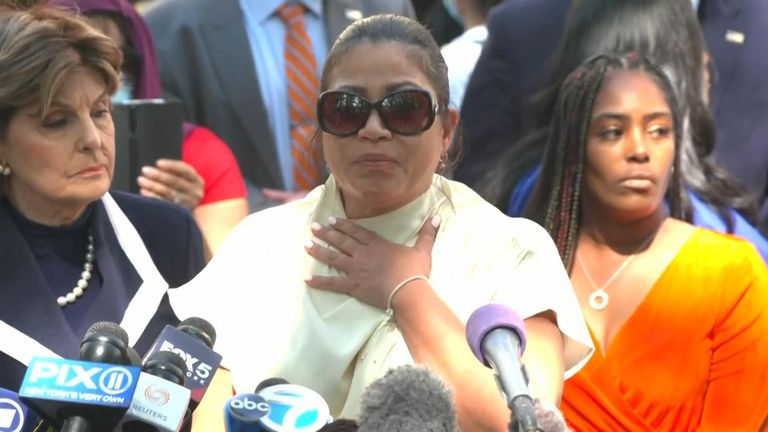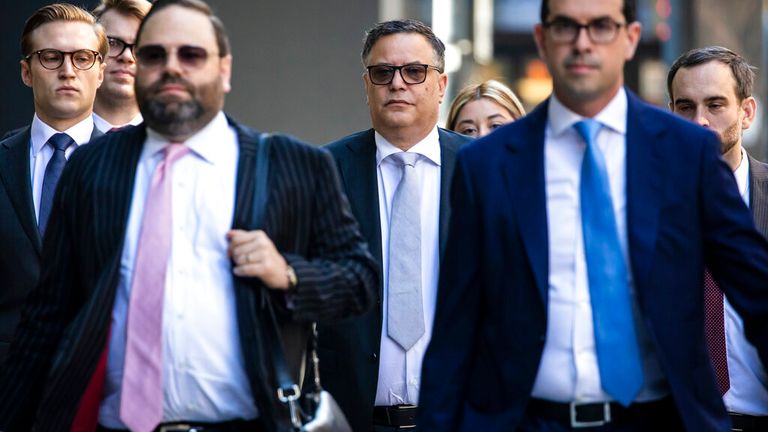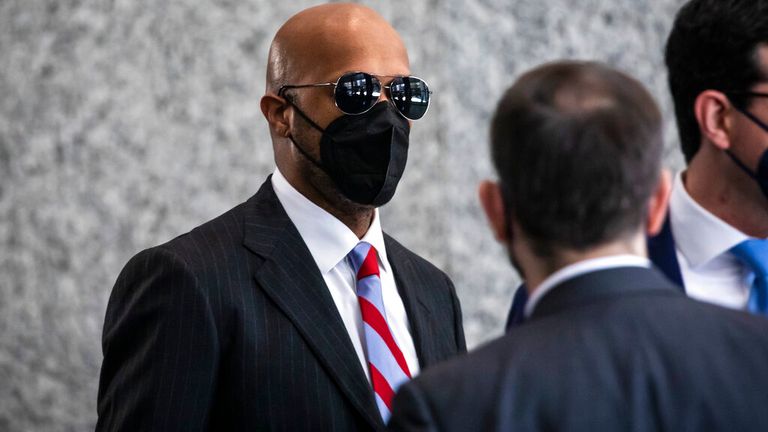R Kelly’s trial on allegations he made child pornography and enticed underage girls for sex is about his “dark” and “hidden” side, prosecutors have said.
The R&B singer is also charged with rigging his 2008 child pornography trial at federal court in his hometown of Chicago, Illinois.
US assistant attorney Jason Julien sought to give the jury a sense of Kelly’s alleged exploitation on Wednesday, saying he “repeatedly” had sex with girls who were just 14, 15 and 16-years-old.
He told the court the “I Believe I Can Fly” singer had sex with “multiple girls, hundreds of times”.
R Kelly was sentenced to 30 years in prison in June for using his fame to sexually abuse young fans.
The 55-year-old is now on trial accused of enticing minors for sex, producing child pornography, and of fixing his 2008 state child pornography trial at which he was acquitted.
A focus of the trial will be on whether Kelly threatened and paid off a girl with whom he allegedly videotaped himself having sex when he was about 30, and she was no older than 14.
The allegation underpins another of the charges against Kelly: conspiracy to obstruct justice.
Jurors in the 2008 child pornography trial acquitted Kelly, with some later explaining that they felt they had no choice because the girl did not give evidence.
The woman, now in her 30s and referred to in court filings only as Minor 1, will be the government’s star witness.
When she gives evidence, prosecutors explained, they will not use her real name, nor refer to her as Minor 1. Instead, they will call her by a single pseudonym: Jane.
She is expected to give evidence that she was on video having sex with Kelly. The recording was at the heart of the month-long 2008 trial and was played for jurors almost every day.
Analysis: Everybody knew the accusations – so why did it take 30 years to get justice?
Kelly – who was recently removed from suicide watch at a Brooklyn jail – also faces four counts of enticement of minors for sex, one each for four other accusers. They, too, are expected to give evidence.
Mr Julien said during opening statements that Kelly’s music career was his “public side”, before going on to say the singer had “another side – a hidden side, a dark side”.
He added: “This trial is about Kelly’s hidden side.”
Jennifer Bonjean, Kelly’s lead attorney, told the jury to reject the prosecution’s portrayal of her client.
“When the government wants to paint him as a monster,” she said, “remember we are talking about a human being.”
Ms Bonjean also warned jurors about what she described as a “mob justice climate” surrounding Kelly, referring to the six-part documentary “Surviving R Kelly” and years of social media posts about his behaviour.
Two Kelly associates, Derrel McDavid and Milton Brown, are co-defendants at the Chicago trial.
McDavid is accused of helping Kelly fix the 2008 trial, while Brown is charged with receiving child pornography.
Like Kelly, they have denied wrongdoing.
Read more:
Key allegations made against R Kelly during his first trial
As both sides began exercising peremptory challenges – in which they can remove a fixed number of potential jurors from the pool – one of Kelly’s lawyers accused prosecutors of seeking to strike black people from the jury to “deny Mr Kelly a jury of his peers”.
Prosecutors noted many African American people had already made it on to the jury before the defence objected, and they argued their reasons for wanting to strike some had nothing to do with race.
In one case, they said an older man appeared to have a hard time staying awake.
Judge Harry Leinenweber partially agreed with the defence, disallowing prosecutors from striking three black people from the jury, and restoring them.
About half the 12 jurors enlisted were identified as black by the judge, prosecutor, and defence attorneys. Six alternates were also selected.
Kelly will be around 80 before qualifying for early release based on his 30-year sentence imposed in New York, against which he is appealing.



